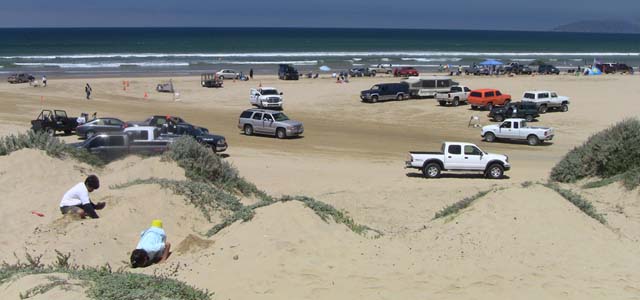Friends of Oceano Dunes awarded $378,273
June 29, 2016
By KAREN VELIE
The court awarded Friends of the Oceano Dunes $378,273 on Wednesday for attorney’s fees and court costs for litigation the group filed objecting to the San Luis Obispo County Air Pollution Control Board’s (APCD) dust rule.
Of the $378,273 award, the APCD is required to pay $358,278. The State of California and the APCD are jointly liable for the remaining $19,995.
The APCD and San Luis Obispo County have faced several lawsuits pertaining to the dust rule and regulation of the Oceano Dunes off-road riding area. The APCD has incurred costs of more than $1.4 million fighting the lawsuits.
“I am extremely pleased by the ruling,” said Jim Suty, Friends of the Oceano Dunes president. “This prevents the APCD from requiring State Parks to have a permit to operate the Oceano Dunes which would have allowed them to potentially close the park at their discretion.”
In 2012, the off-roading organization sued the APCD, arguing the agency used flawed scientific practices in implementing the dust rule and failed to prove off-road activity caused an increase in pollution on the Nipomo Mesa. Friends also questioned the legality of the APCD regulating air emissions at a state park through the permit process.
The dust rule requires state parks to reduce the particulate matter blowing from the Oceano Dunes State Vehicular Recreation Area or face fines of $1,000 per day.
Last year, the 2nd District Court of Appeal ruled that an air pollution control district does not have the power to regulate emissions from a state park by a permit requirement. The ruling nullified a section of the dust rule that required state parks to obtain a permit from the air district in order to operate the riding area.
In March, San Luis Obispo County Superior Court Judge Charles Crandall ruled the removal of the permit requirement does not void the entire dust rule and the APCD retains the power to enforce the regulation through civil penalties and other coercive action.
“It matters not that this court may have disagreed with the appellate court’s findings, or that the district acted in good faith in promulgating Rule 1001, or that the district believed it was operating within its powers,” Crandall wrote in his ruling. “The action resulted in the enforcement of an important right affecting the public’s interest. “
In April, Friends filed a lawsuit against the California Coastal Commission over the agency’s role in implementing the controversial regulation. The lawsuit also names state parks as a co-defendant and the APCD as a party of interest.







The comments below represent the opinion of the writer and do not represent the views or policies of CalCoastNews.com. Please address the Policies, events and arguments, not the person. Constructive debate is good; mockery, taunting, and name calling is not. Comment Guidelines